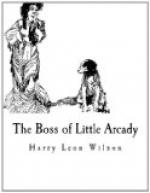To the west, away from the river, the town has groped beyond a prairie frontier that had once been sacred to boyish games and the family cow. Now, so thickly was it built with neat white houses, that only with strenuous clairvoyance could famous old localities be identified: the ball-ground; the marshy stretch that made skating in winter, or, in spring, a fascinating place to catch cold by wading; the grassy common where “shinny” was played by day and “Yellow Horn” by night; the enchanted spot where the circus built airy castles of canvas, and where, on the day after, one might plant one’s feet squarely in the magic ring, on the veritable spot, perchance, where the clown had superhumanly ridden the difficult trick-mule after local volunteers had failed so entertainingly.
Barns in this once wild country had failed amazingly. Only one of any character was left, and it had shrunk. Of old a structure of possibilities intensely romantic, it was now dingy, pitiable, insignificant. No reasonable person would consider holding a circus there—admission ten pins for boys and five pins for girls.
Orchards, too, had suffered. Acres of them, once known to their last tree, including the safest routes of approach by day or night, had been cut down to make space for substantial but unexciting houses, quite like the houses in anybody’s town. Other orchards had shrunk to a few poor unproductive trees so little prized by their owners that they could no longer excite evil thoughts in the young.
Indeed, almost everything had shrunk. The church steeples, once of an inconceivable height, were now but a scant sixty feet; and the buildings beneath them, that once had vied with old-world cathedrals, were seen to be but toy churches.
Especially had gardens shrunk. One that boasted the widest area in days when it must be hoed for the advantage of potatoes insanely planted there, was now a plot so tiny that the returned wanderer, amazedly staring at it, abandoned all effort to make it occupy its old place in his memory.
North and south were dozens of strange, prim houses to puzzle up the streets. The street-signs, another innovation, were truly needed. Of old it had been enough to say “down toward the depot,” “out by the McCormick place,” “next to the Presbyterian church,” “up around the schoolhouse,” or “down by the lumber yard.” But now it was plain that one had to know First, Second, and Third streets, Washington, Adams, and Jefferson streets.
Socially as well, the town had changed. Not only is the native stock more travelled, speaking—entirely without an air—of trips to the Yellowstone, to Europe, Chicago, or Santa Barbara, but a new element has invaded the little country. It goes in the fall, but it comes again each summer, drawn by the green beauty of the spot, and it has left its impress.




